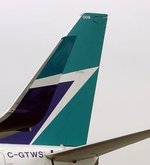Canada’s second largest carrier West Jet Airlines Ltd. posted higher 3rd quarter earnings on Tuesday and predicted greater capital expenditure in 2014. However, after CEO Gregg Saretsky pledged to keep airfares low its share price declined.
The low cost carrier is expanding into international routes, but the company emphasized that cheap fares are the main priority for the business.
Mr. Saretsky said:
“I am loathe to take any fare increases. Our whole ethos here is to provide Canadians with access to affordable travel, so we are all motivated to continue to move fares down, and that requires us to take cost out of our business.”
After his comments shares slipped 3.9% to C$30.77.
Investors had wanted talk about revenue growth and not just cost control. After hearing about checked bag fees on Monday its share price rose, but Tuesday’s announcement of reducing fares had the opposite effect.
The airline expects an additional income of $100 million annually from baggage fees.
Gregg Saretsky has been WestJet’s President and Chief Executive Officer since April 2010. (Photo: WestJet Ltd.)
WestJet foresees capital expenditures for 2015 of between C$830 million and C$840 million, compared to a c$660 estimate in 2014. The airline is changing all the seats across its fleet – they new ones will have Wifi systems installed.
There will be more seats per airplane. Mr. Saretsky assured investors that passengers would not notice any alterations in leg room.
It is also installing a new entertainment system which will be operational in 2015.
Mr. Saretsky said:
“The impact on our brand is going to be positive because we’re going to provide more features for our guests… and the opportunity to densify the fleet gives (us) a chance to further reduce our fares. So everything that we’re doing is with the mindset of how do we keep dropping fares in Canada. We haven’t given up on continuing to scratch away at other ideas to do that without compromising the brand.”
The company improved its 2014 cost guidance, saying now it predicts cost per available seat mile to increase from 1% to 1.5% (excl. fuel and profit sharing). Profit sharing occurs when a business gives its employees a percentage of its annual profit.
For its October 2014 traffic results, WestJet announced it had a load factor of 77.4%. Revenue passenger miles rose by 6.8% year-over year, while capacity grew by 9.2%.
WestJet flew a record 1.6 million passengers in October, which was 6% more than in October 2013 (90,000 more).


